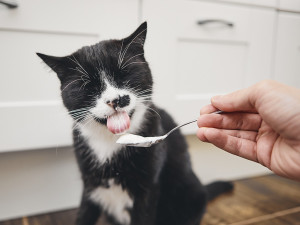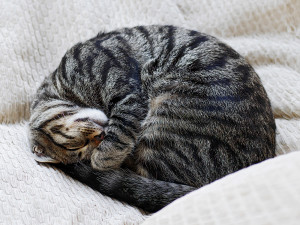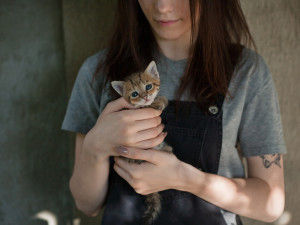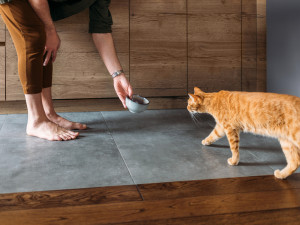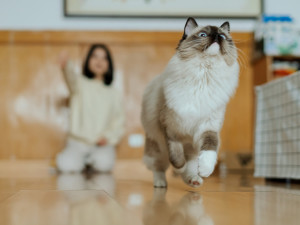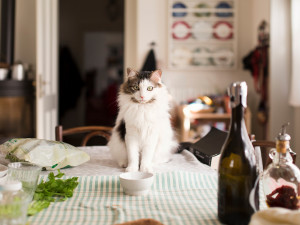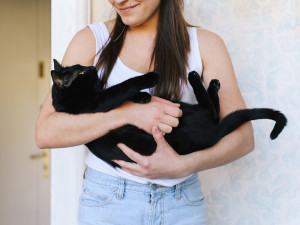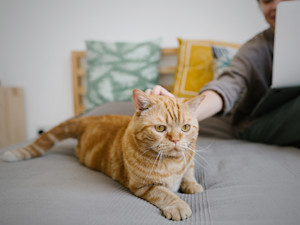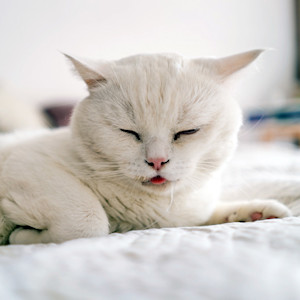Uncovered Secrets: Why Cats Don’t Always Cover Their Poo
And how you can encourage them to cover up after doing their business
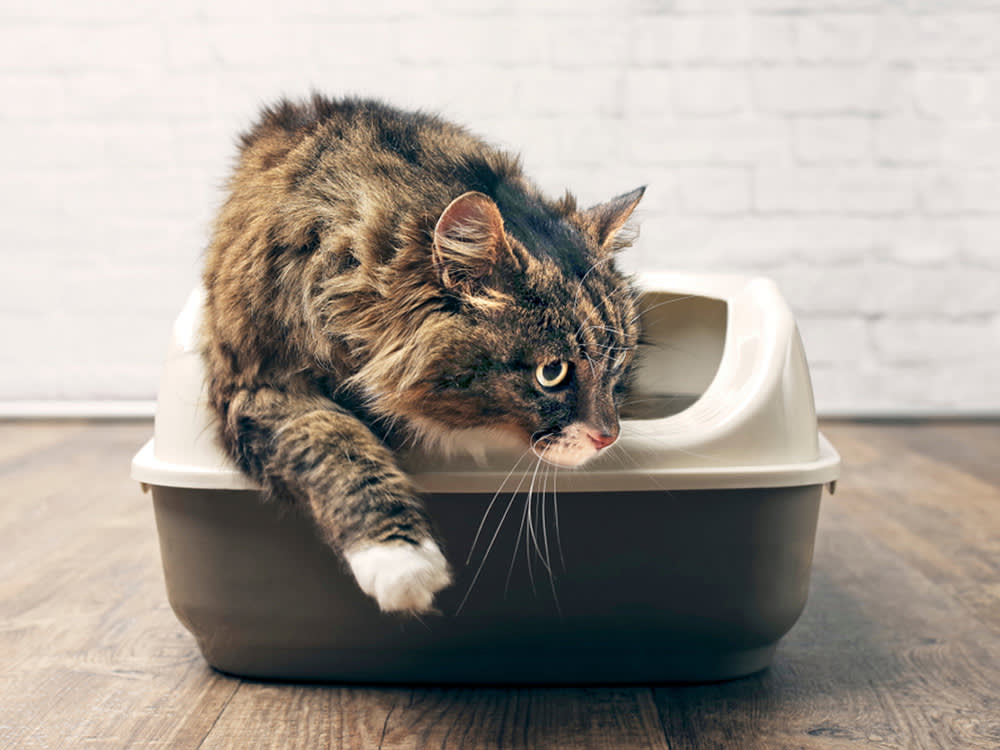
Share Article
Cats usually cover their poo, and that makes us happy because it lowers the gross factor of having poo-filled boxes in our homes. Oh, the things we do for love! But nothing – least of all love – is ever simple, which is why there is much to share about the subject of poo covering as performed by (or sometimes not accomplished by) our feline companions.
Why do cats cover their poo?
There are reasons for cats to cover their poo that go beyond us wanting them to. Sure, we’d like to think it has to do with their reputation as naturally fastidious for the sake of their dignity, but that’s a bit off base. A likely reason cats bury their poo is to prevent predators from finding them. By hiding the scent, they may be safer from those in search of them for nefarious reasons. Even though you (hopefully) don’t have predators in your house, your cat is acting the way their ancestors did, and not necessarily reacting to current conditions.
Is it normal for kittens not to cover their poo?
It is normal for kittens not to cover their poo. Usually their mothers show them how to cover their poo by setting a good example of doing so, but not all of them learn it really well. Cats who are separated from their mothers very early for any reason must learn this skill without observing their mum. Some kittens are still learning to be poo coverers, so they may not do it all the time or even at all. In general, adults cats are more likely to cover their poo than kittens are.
Why don’t cats always cover their poo?
Behaviour is complex; there are many variables, and every individual is different. Each cat is unique, and yet none are able to tell us in plain English why they do or don’t exhibit a particular behaviour. When it comes to poo, to cover or not to cover, that is the question, and we can make some guesses about the answer.
Medical reasons
Pain, illness or injury can make it difficult for a cat to cover their poo. If a cat experiences pain when defecating, they are likely to be eager to get out of the litter box as soon as possible since they will associate being there with the pain. If they feel unwell due to any cause, the same reasoning may apply. If it causes them pain to cover their poo, either because of an issue in a joint or an injury to a paw, for example, they may skip this step even though it is usually part of their bathroom routine.
Litter box problems
If a cat is not happy with their litter box, one response may be to leave their poo uncovered. That may mean a litter box that is too small, dirty, has a cover that makes them feel trapped, or is in a location that makes them uncomfortable. Some cats do not like to be in litter boxes in areas where they feel trapped because there is only one way out of it and another member of the household could be there blocking their path. Other cats dislike using a litter box in a high-traffic area of the house where someone could go by them while they are using it.
Stress
Stress can cause a cat to stop covering their poo. The stress may be associated with the litter box itself or totally unrelated. A cat who gets spooked in the litter box or is uncomfortable with any aspect of their bathroom may stop covering their poop. Or, a cat who is stressed by some other factor that has nothing to do with the litter box may show the exact same behavioural change. A new cat or dog in the household, a new baby, loud sounds from a house renovation, tension between family members related to their relationship or financial issues, house guests, a change in your work schedule, a new delivery person who rings the bell instead of knocking, the smell of a new perfume or candle – the list of circumstances that can cause a cat stress is endless, and any stressor can cause behavioural change. Sometimes that behavioural change is to stop covering their poo.
Territorial marking
In the wild, very confident cats will sometimes leave their poo uncovered as a way of marking their territory. That same pattern of cats who are very sure of themselves in a home may also leave their poo alone after defecating. They are taking advantage of the odour of the poo because it functions as a social signal they wish to broadcast to the rest of the household.
Learning
As is the case with so many behaviours that we expect animals to know how to do, they actually need to learn to perform the behaviour. This is true of covering poo by cats. If a cat was not shown how to cover their poo as a kitten, they may not know how to do it as an adult. Some cats have learnt to cover their poo, but may not be committed to the behaviour, so there are many cats who cover their poo some of the time but not all the time. Others have not learnt this lesson at all, and these cats never cover their poo.
How can I encourage my cat to cover their poo?
If you cat is not covering their poo and you want them to pick up this habit, there are steps you can take towards this goal. Don’t expect it to happen instantly, because cats need time to change behaviour. Some cats are quick to change their habits, and others may take much longer to get there.
Rule out medical reasons
If your cat has recently stopped covering their poo, the first step is to take them to the vet to rule out any medical problems. If a medical issue is at the root of the problem, you have to resolve that medical issue before you can expect to have any success changing your cat’s behaviour for the better.
Make sure the litter box is appealing to your cat
Cats are more likely to be good litter box citizens if they like the litter box. Design the litter box with the cat in mind, rather than doing what people may want in this feature of the house. Place the litter box in a quiet location where they won’t be bothered by a lot of household traffic. Place litter boxes far away from where they eat. Just like us, cats prefer that their kitchen and their bathroom be separate and not the same place. Some cats immediately start covering their poo if given access to a bigger litter box. Cats generally prefer large litter boxes with low sides and without a cover. (The cover is very popular with humans but not with cats, so this is the key feature that requires you do what the cat wants and not what the people want.)
Try different types of litter
Some cats prefer certain types of litter over others. Try different types of litter to see if you can find one your cat likes. Some cats only like the litter type they are familiar with and become upset by any change to a different kind. Cats generally prefer unscented litter to scented litter. Most cats prefer fine litter to those with larger pellets, likely because the larger grains can aggravate their paws and are uncomfortable. It is common for cats to prefer clay litter to litter made of other materials, though some cats who seem to hate most types of litter equally do really well with paper litter. No matter what type of litter you use, keep the litter box clean, scooping at least daily. There are cats who will cover their poo in a clean litter box but not in one that is dirty.
Have multiple litter boxes
Most cats prefer to have choices, and multiple litter boxes allows for that. Some cats like to urinate in one box and defecate in another, and this obviously requires more than one litter box. If your house has multiple levels, be sure to have at least one litter box on each floor of your home. A standard guideline is to have at least one more litter box than you have cats, so if your household has three cats, you should have at least four litter boxes.
Be patient
It may take some time and patience to get your cat to cover their poo consistently. Like any other behaviour change, it is likely to happen gradually rather than all at once. Remember that your cat has no way of knowing how important poo covering is to you, and they deserve to be treated with kindness and constant patience as they learn this skill.
Should I be concerned if my cat doesn’t cover their poo?
Most of us prefer for our cats to cover their poo. It keeps that eau de cat faeces smell under control, which is good. Covering their poo is one of the ways they make themselves better housemates, and we appreciate it when they do it. Some cats are just not into covering their poo, and that is not necessarily something to be concerned about. In fact, if that is their only litter box issue, there’s an argument to be made that it might be worth leaving them alone, and taking care of covering or scooping the poo right away yourself so you don’t cause other issues. If a cat is at least going in the litter box, it’s worthwhile to remember to be grateful for that.
However, if your cat used to cover their poo and they have stopped doing so, that is concerning. There could be a medical issue that is the cause of the change in behaviour, and it is possible they are in pain or at least uncomfortable. Stress may also cause a cat to stop covering their poo, and that is also worrisome. So, not covering poo may not be something to be concerned about, but if your cat changes from being a poo coverer to a non-coverer, the behavioural change may be a clue about a serious matter. If that’s the case with your cat, contact a cat behaviourist or a veterinarian who has some expertise in behaviour so you can help your cat deal with any troublesome issues they are facing.
Can I train my cat to cover their poo?
Most cats who don’t cover their poo can be encouraged to pick up this behaviour with a litter box remodel, but if your cat is still not on board, you can train them to cover their poo. Use a clicker and start to reinforce (click and treat) any behaviour that is related to poo covering. That might be pawing at the litter at all, pawing in the air on the sides of the litter box, or staying in the litter box for a moment after pooing or any kind of motion in the litter with their paws. Then, you start to reinforce (again, click and treat) any behaviour that is even closer to poo covering such as staying in the litter box even longer, pawing at the litter for longer, or pawing in the air or the sides of the litter box lower down and closer to the litter. Keep reinforcing your cat for increasingly closer approximations to the actual behaviour you want (covering their poo) until they are doing this reliably.
Poo covering is like any other type of behaviour; there is a lot of variation between cats and even in the same cat from one day to the next. Cats vary in their poo-covering tendencies. Some are fastidious felines, but others are relaxed about toilet habits and don’t bother. In between are cats who sometimes cover their poo, but sometimes don’t bother. Age can be one factor, because kittens are less likely to be poo coverers than adult cats.
Frequently asked questions
Why don’t cats always cover their poo?
They may see no reason to if they are completely comfortable in their home, or they may be too stressed, or they may not like the litter box or the type of litter in it.
Should I be concerned if my cat doesn’t cover their poo?
If they never learnt to cover their poo, it may not be a problem, but if they have recently stopped doing so, there may be a new behavioural or medical issue that needs to be addressed.
How can I encourage my cat to cover their poo?
Add additional litter boxes, make sure to keep them clean, and consider larger ones that are uncovered or have lower sides. Also, actively train them to cover their poo.
Can I train my cat to cover their poo?
Cats can be trained to cover their poo, but some cats learn this lesson quickly and others take longer. Be prepared to be patient while teaching your cat this skill.
Is it normal for kittens not to cover their poo?
Many kittens are still learning the ‘cover your poo’ lesson, and it’s totally normal for kittens to be works in progress with regards to this behaviour.
Why do cats know to cover their poo?
It is a natural behaviour for many cats, and they may learn to cover their poo by observing other cats do so.
References

Karen B. London, PhD, CAAB, CPDT-KA
Karen B. London, Ph.D., is a Certified Applied Animal Behaviorist and Certified Professional Dog Trainer who specializes in working with dogs with serious behavioral issues, including aggression, and has also trained other animals including cats, birds, snakes, and insects.
Related articles
![cat staring at person on table]()
Why is My Cat Giving Me the Evil Eye?
...Is it something I said?
![White kitten with tongue out next to slices of watermelon]()
Can My Cat Safely Enjoy Watermelon?
Yes, the summertime staple is on the list of safe foods for cats
![Woman Holding Her Black Cat.]()
Step-by-Step Guide: How to Safely Express Your Cat’s Anal Glands At Home
Ick. It won’t be fun, but here’s how to get the job done
![Owner pets senior ginger cat.]()
6 Common Health Concerns in Senior Cats
How to spot and how to treat them
![Curled up tabby cat sleeping on pillows]()
How Many Cat Naps Is Too Many?
A very sleepy kitty isn’t usually a problem, but watch out for these signs of medical distress
![white cat with eyes closed drooling]()
Dogs Rule, Cats Drool, Right?
Sometimes it works the other way round – here’s why your cat is drooling

